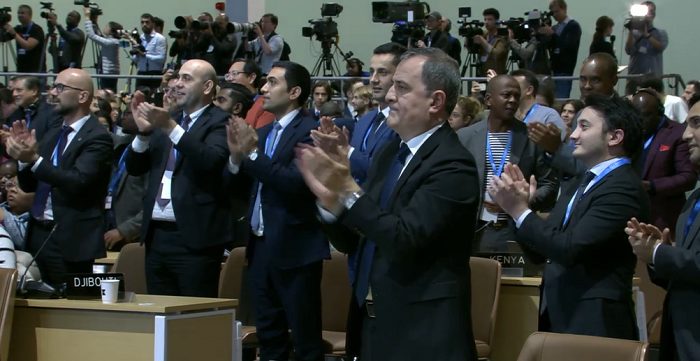Billed as the “Finance COP”, the UN climate talks fell short of expectations and needs. The most vulnerable countries, already bearing the brunt of increasingly severe climate impacts were forced to accept a token financial pledge to prevent the collapse of negotiations – a stark reminder of the persistent imbalance in global climate justice.

Developed countries committed just “at least $300 billion per year” from a variety of sources – including public and private – a figure that risks deepening the debt burden for vulnerable nations who are already paying the price of the climate crisis. High-income countries, responsible for the bulk of historical emissions, owe trillions to nations shouldering the costs.
Landry Ninteretse, Africa Regional Director at 350.org, said: “COP29 has once again fallen short of what is urgently needed for African communities grappling with the devastating impacts of the climate crisis. The lack of decisive action and the required finance for adaptation and energy transition is a stark betrayal of those who have contributed the least to global warming but suffer the most from its consequences.
“But while governments stall, Africa’s solutions are moving forward. Initiatives like REPower Afrika are proof that community-led renewable energy projects can deliver real change. Across the continent, people are already showing what a just transition can look like – replacing fossil fuels with clean, affordable energy that prioritises livelihoods and the planet.
“As we look ahead to COP30, the message is clear: Africa demands a systemic overhaul of global climate finance – just, fair, urgent, and responding to the scale of appropriate adaptation and mitigation needs for our communities. Rich nations must stop the delays and deliver the financing that African communities deserve. The solutions are here, and the renewable energy revolution is underway – driven by people, for the people. The world must follow their lead.”
Namrata Chowdhary, Head of Public Engagement at 350.org, said: “Once again, inequity has driven a hard bargain that the vulnerable have no choice but to accept. Rich countries have failed to honour their responsibilities and shown up with rigid unwillingness to meet this moment with the ambition required to address the climate crisis. As this deal gets pushed through in this dark, disappointing moment, we continue to stand in solidarity with those most impacted by both – a crisis they did not cause, and a result they could not influence.
“This deal has failed to meet the ambition needed, but as we’ve seen over the past two weeks in the halls of the COP venue and the many actions held across the world, hope and ambition are alive and well in the climate movement. We are already looking ahead and preparing to build new momentum in the global movement for climate justice, with a wave of campaigns and mobilisations focussed on real solutions to the climate crisis.”
The lack of financial backing from rich nations continues to obstruct meaningful progress on adaptation and mitigation, particularly in regions hardest hit by climate impacts. Instead, greenwashing tactics such as global carbon markets and unproven technologies are being touted as solutions, but without adequate funding, they remain out of reach for the most vulnerable communities.
Rich countries continue to keep money locked away by enforcing austerity measures, signalling to their citizens that resources are too scarce to invest in public services, social security, or climate action – a false claim and one that blocks progress on the renewable energy transition.
As the G20 declaration hinted, taxing the ultra-rich, financial transactions, aviation, shipping, and extractive industries could raise trillions annually, unlocking critical funds for climate finance, bolstering public services, and driving healthier, more equitable, and sustainable communities.
The conclusion of COP29 comes at the end of a record-breaking year for climate impacts, with rising temperatures, floods, hurricanes, droughts, and wildfires destroying communities and ecosystems worldwide. Every fraction of a degree matters, and we cannot delay action on climate any longer if we are to keep the hope of limiting the global temperature increase to 1.5°C alive.
In the face of governments failing us, social movements are showing leadership and driving forward renewable energy solutions that are locally led and put communities first. Indigenous groups in Brazil are calling to co-lead the UN climate conference in Belém, the Brazilian Amazon, alongside Brazil next year, acknowledging that they are the guardians of our ecosystems and are leaders in climate solutions. Meanwhile, civil society across the world has been taking to the streets demanding action from world leaders, holding the richest and most polluting individuals and companies to account, and demanding investment in renewable energy.
Next year’s COP30 in Brazil is expected to see an unprecedented demonstration of solidarity and strength from Indigenous peoples, Small Island Developing States, Global South communities, and the international climate movement. In the wake of COP29’s failure to deliver, all eyes have turned promptly to Brazil as the next critical arena in which to fight for climate justice, human rights, and robust international cooperation.
